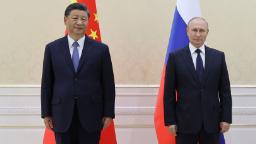
Hongkong
CNN
—
The Kremlin said Xi Jinping and Vladimir Putin were scheduled to speak via videoconference on Friday, as analysts watched for signs that the Chinese leader’s support for the Russian president had softened more than 10 months after the war in Ukraine as China Facing an unprecedented Covid outbreak.
Kremlin spokesman Dmitry Peskov said on Thursday that the two leaders will mainly discuss bilateral relations between the two countries and exchange views on regional issues and strategic partnership.
Moscow and Beijing have grown closer in recent years, with Xi and Putin announcing an “unrestricted” partnership between the two countries weeks before Russia’s invasion of Ukraine in February.
China has since refused to condemn the aggression, instead repeatedly blaming NATO and the United States for the conflict – and remains one of Russia’s main backers as it becomes increasingly isolated on the world stage.
But after more than 10 months of grinding, the world looks very different — and the dynamic between the two sides has changed accordingly, experts say.
Instead of achieving the expected quick fix, Putin’s invasion has been hobbled by numerous setbacks on the battlefield, including a lack of basic equipment. Morale is low in parts of Russia, and many civilians face economic difficulties during the harsh winter.
On Thursday, Russia launched what Ukrainian officials said was one of the largest missile strikes since the war began in February, blasting villages and cities across Ukraine, damaging civilian infrastructure and killing at least three people.
Ukrainian officials have been warning for days that Russia is preparing an all-out attack on the power grid to end 2022, plunging the country into darkness as Ukrainians try to ring in the New Year and celebrate the Christmas holiday. The country’s Orthodox Christians fell on January 7th.
“China longs for (the war) to end,” said Yun Sun, director of the China Program at the Stimson Center, a Washington think tank.
“Xi Jinping will try to emphasize to Putin the importance of peace,” she added. “If Russia is impatient with the lack of progress on the battlefield, in China’s view the time is ripe for peace talks.”
Alfred Wu, an associate professor at the Lee Kuan Yew School of Public Policy at the National University of Singapore, said China’s stance on Russia was also increasingly isolated.
Wu cited Indian Prime Minister Narendra Modi as an example of his tough stance on Russia’s war.
While India did not directly condemn Moscow’s incursion, Modi told Putin in September that now was not the time for war and urged him to move toward peace.
The shift means China is now more isolated in its relationship with Russia, Wu said, another reason Xi may be keen to see a quick resolution.
Xi had already shown signs of impatience when he last met Putin at a regional summit in Uzbekistan in September. At the time, Putin seemed to be implicitly acknowledging their differing views by acknowledging that Beijing had “doubts and concerns” about the invasion.
But China’s domestic situation has also changed significantly in the months since, experts say, and this time may call for a different approach to Putin.
The country is now battling its worst ever Covid outbreak after finally ditching its strict zero-Covid policy, easing restrictions and partially reopening its borders. The U-turn comes after an unprecedented wave of nationwide protests against zero coronavirus — which in some cases expanded to include broader discontent with Xi Jinping and the ruling Communist Party.
At the center of the crisis is Xi Jinping, who entered an unconventional third term in October with a tight grip on power and an intimate group of supporters.
“Now that the domestic issues have been resolved, Xi Jinping is in a better position to deal with Russia,” Sun of the Stimson Center said of his October consolidation of power.
She added that trade between the two countries had increased this year due to high global energy prices – and that the two leaders could “renew their pledge to cooperate economically”.
However, the protests, the coronavirus outbreak and the ensuing economic damage have left Xi in a more vulnerable position, which could mean less material and public support for Russia, Wu said.
“The policy tools that Xi can use to support Russia right now are very limited, quite limited,” Wu said. “Politically, domestic support for Xi Jinping has plummeted. His third term actually didn’t start off with a rosy picture.”